Samnite War: 320 BC, By Brendan Clark
As 320 BC begins, the Republic of Rome has full control of Latium, its ‘home’ province. To its south lays the province of Campania, an ally of Rome. Rome exercises ‘diplomatic control’ over Campania, which allows Rome’s forces to freely enter its territory and cities. To Rome’s east and south east is the province of its principal opponent in central Italy, Samnium, home to the hill tribe called the Samnites.
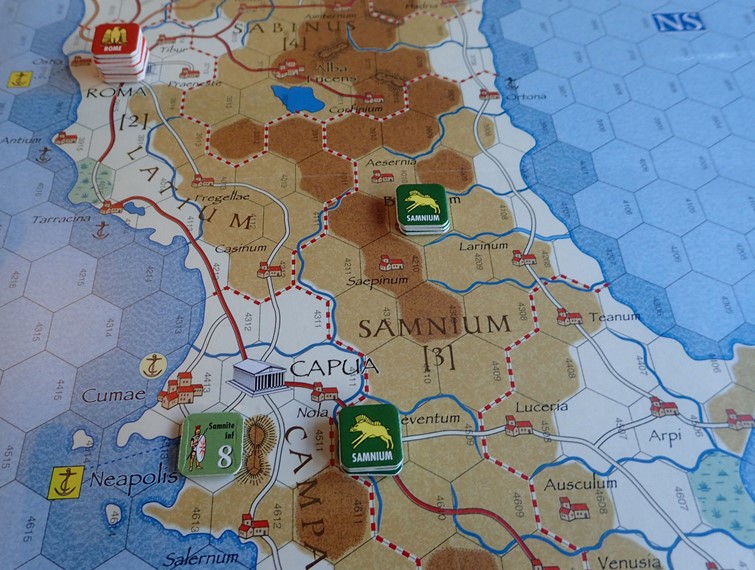
At start deployment, clockwise from top-left:
-
In Rome:
-
Calvinus, Rome Consul, in command of the I consular army, comprising the I and II Legions, with 11,000 legionary infantry and 1,200 cavalry.
-
Albinus, Field Consul, in command of the II consular army, comprising only one Legion, the III, with 5,500 legionary infantry and 600 cavalry.
-
Rutilus, Praetor Urbanus, in command of 2,500 legionary infantry from the Urban Legion.
-
-
In Bovianum: Pontius, Samnite overall commander, in command of the I Samnite army, with 9,000 infantry and 900 cavalry.
-
In Beneventum: Brutulus, in command of the II Samnite army, with 7,500 infantry and 600 cavalry.
-
Outside the city of Neapolis, having been ejected by its citizens, 4,000 Samnite infantry.

 Two hapless men, destined to lead in time of war, rise to esteemed rank in Rome, Calvinus, Consul for Rome, and Albinus, Field Consul. Just weeks later, conflict emerges in Campania. After enduring the arrogance of their oppressors, Greek colonialists, citizens of Neapolis, rise up against their Samnite occupiers. With the Samnite troops ejected from the city, the Greek citizens act to forestall a Samnite siege by appealing to Rome for military assistance.
Two hapless men, destined to lead in time of war, rise to esteemed rank in Rome, Calvinus, Consul for Rome, and Albinus, Field Consul. Just weeks later, conflict emerges in Campania. After enduring the arrogance of their oppressors, Greek colonialists, citizens of Neapolis, rise up against their Samnite occupiers. With the Samnite troops ejected from the city, the Greek citizens act to forestall a Samnite siege by appealing to Rome for military assistance.
 Seeing an opportunity both to dominate their troublesome neighbours, the Samnites, and extend their territories beyond the borders of Latium, the Senate in Rome approves a series of measures for a decisive war. In the first step, Calvinus begins a recruitment drive, raising two new Legions, one joining an existing Legion to form the II consular Army, while the other is placed under the command of a newly-appointed Praetor, Cursor.
Seeing an opportunity both to dominate their troublesome neighbours, the Samnites, and extend their territories beyond the borders of Latium, the Senate in Rome approves a series of measures for a decisive war. In the first step, Calvinus begins a recruitment drive, raising two new Legions, one joining an existing Legion to form the II consular Army, while the other is placed under the command of a newly-appointed Praetor, Cursor.
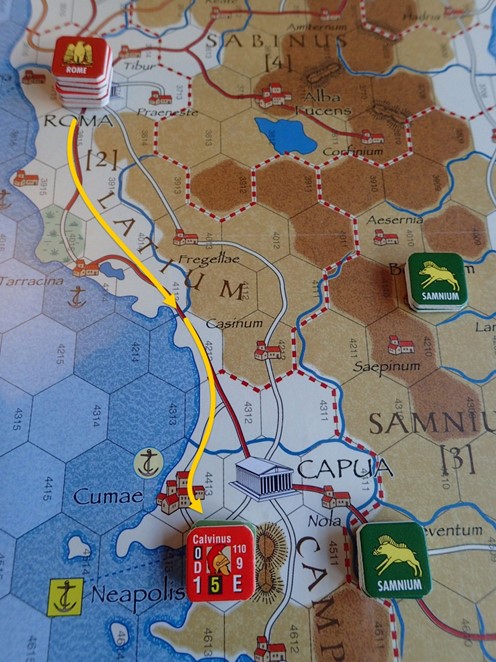
.

Soon afterwards, Calvinus sets off with the I consular Army, marching south to Neapolis.
Arriving near the city, Calvinus locates the Samnite force expelled from Neapolis, some 4,000 infantry, and attacks with his I Legion and II Legion. Despite the presence of the veteran I Legion, and his numerical advantage of 3:1, the battle is inconclusive . Calvinus then moves the I Consular army inside Neapolis while the Samnite force, now reduced to 3,500, lingers in the surrounding countryside.


Responding to Rome’s intervention, Samnite commander Brutulus issues a call to arms and 3,000 new recruits arrive in the Samnite capital, Bovianum, where they join the Samnite Ist army, bringing its numbers to 12,000 infantry and 900 cavalry.


.
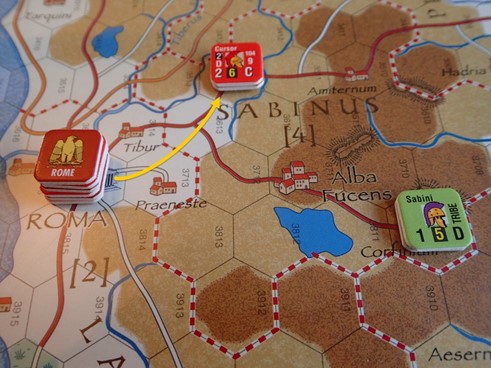
In Rome, the Senate gives permission for the praetor, Cursor, to leave Latium. He marches with the V Legion north east into the neighbouring province of Sabinus, arriving near the city of Reate. This incursion triggers a revolt and 4,000 Sabini infantry gather in the mountain city of Corfinium. Cursor now blockades Reate and places it under siege.

.
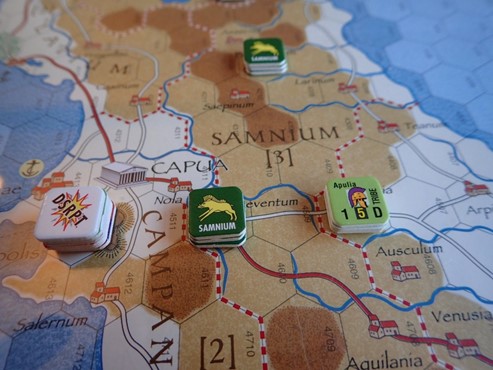
Unsettled by the advent of war, the tribes of Apulia also now rise in revolt, with 5,000 infantry and 600 cavalry concentrating in Luceria, on the border with Samnium.
Meanwhile, north in Sabinus, as the siege of Reate drags on, the city militia mostly succumb to starvation and the city open’s its gates to Cursor’s V Legion. Showing no mercy, Cursor has his troops sack the city, leaving it in ruins, though his Legion runs amok and is disrupted. Rome’s retribution terrorises the people of Sabinus and as well as those of nearby Etruria and Umbria.

 Now Pontius, overall commander of Samnium’s forces, marches from Bovianum with the Ist Samnite army, leaving a garrison of 1,500 infantry in the city. His march takes his army south around the mountains that bound the border with Latium, then west, before turning northwards into Latium. The Samnite army marches within 25 miles of Rome as it heads towards Cursor and his V Legion. But Albinus, the Field Consul, in command of the II consular army, based in Rome, fails in an attempt to intercept the passing Samnite army.
Now Pontius, overall commander of Samnium’s forces, marches from Bovianum with the Ist Samnite army, leaving a garrison of 1,500 infantry in the city. His march takes his army south around the mountains that bound the border with Latium, then west, before turning northwards into Latium. The Samnite army marches within 25 miles of Rome as it heads towards Cursor and his V Legion. But Albinus, the Field Consul, in command of the II consular army, based in Rome, fails in an attempt to intercept the passing Samnite army.
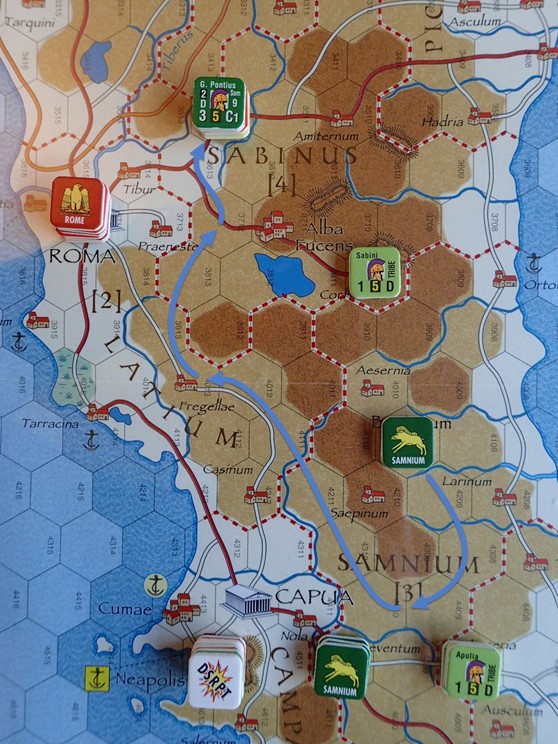
As Pontius arrives with his army in the vicinity of the ruined city of Reate, he is suddenly attacked by 4,000 infantry of the Sabini tribe. The Sabini are defeated and withdraw but the Samnite army loses 2,000 infantry and 300 cavalry, and Pontius is lucky to escape without injury.
With the Sabini threat dealt with, Pontius advances on Cursor and his V Legion. Cursor stands his ground, refusing to consider withdrawal. The Samnite army now numbers 7,500 infantry and 600 cavalry; while the V Legion has 5,500 infantry and 600 cavalry. Pontius attacks but is frustrated by Cursor’s able defence and the outcome is a stalemate with both sides taking losses,.
The Sabini tribe makes another appearance, this time taking their anger out against the Romans by attacking Cursor and his Legion with 3,000 infantry. Cursor drives them off, and the Sabini skulk away, having lost one in four of their number.
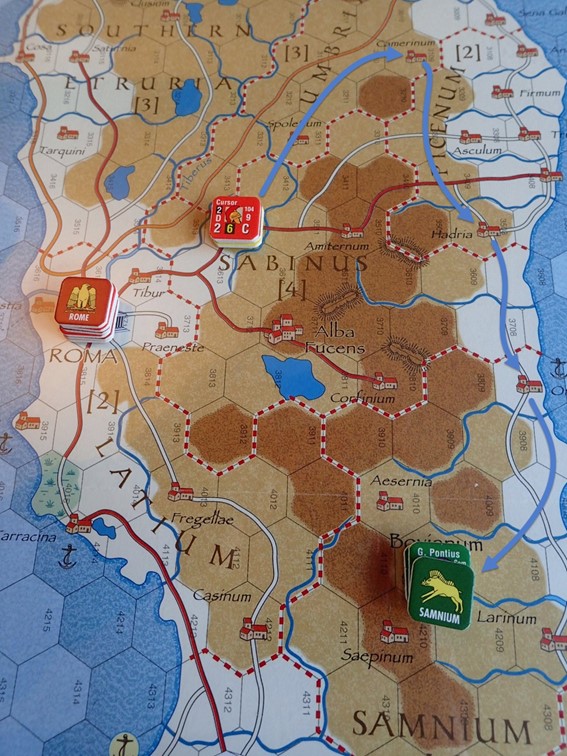
Pontius now returns home, marching his army north-east and then through Umbria, Picenum and Sabinus as he heads for Samnium, arriving in Bovianum with an army depleted by marching and fighting, now numbering 5,500 infantry and 600 cavalry. He spends the remainder of the campaign season resting his troops in the Samnite capital.
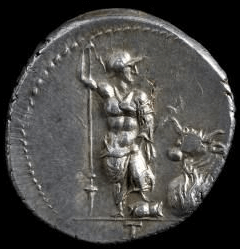
Fun read. Looking forward to the next installment.